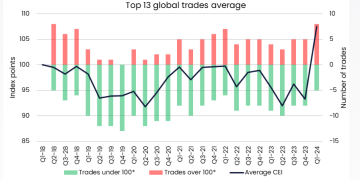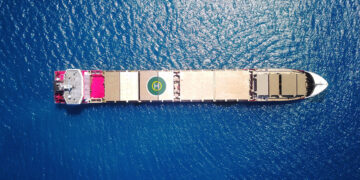If You Dodge the Training, You Pay the Price
Mitigation of piracy and other security events at sea have met with greater complexity due to increased violence and increased activity. Maritime security training must rise to this need as well as the necessity of managing the growing violence against the maritime industry.
The increased violence from piracy has resulted in the maritime and oil industries of western Africa to begin readying themselves to be more proactive in maritime security and defense. As an example, a German company has reflagged all of its vessels so that they will be able to take armed action if needed. Comments have even been heard about arming offshore support vessels from people who just a few months ago wouldnt consider such an idea. Training needs in the maritime industry have changed dramatically.
Until recently, the maritime industry has been a de facto enabler of piracy. Instead of elevating the risk to pirates and other attackers, the industry has chosen the passive approach of placation for maritime security. The industry has placated the pirates, the lawyers, the accountants, the military, many in law enforcement, and people in government and other special interest groups who refuse to recognize that there IS evil in the world.
The passive approach has resulted in hundreds of vessels being hijacked, mariners being injured, tortured, and even killed. In some regions civilians in coastal communities are being kidnapped and murdered. The list of atrocities goes on. Yet there has not been a known loss of vessels or lives when an armed defense was available. We cannot recall a single example from history in which placation of pirates or terrorists have been successful.
Navies and other government interventions in security at sea have been only marginally effective. In the days when Mediterranean pirates took Julius Caesar captive for ransom, the Roman fleet took on and destroyed the pirate fleet. Similarly, the U.S. Navy defeated the Barbary Pirates.
The Navy makes sense when facing the battleground fleet to fleet. Using a Navy to defend against the pirates we see today, without a fleet in opposition, is like swatting a fly with a hand grenade; it makes a mess but little is accomplished. The job of governments should be to follow the international money trail and enable the maritime to defend itself. The maritime industry needs to accept the challenge.
Many in the industry consider all security events at sea to be some sort of piracy. This perspective is a dangerous falsehood. Looking at Nigeria, for instance, there has been an increased level of pirate activity. However, with such organizations as MEND carrying out attacks and kidnappings, and now a greater threat from terrorism as demonstrated by the June detonation of a suicide bomb in Abuja, a broader perspective of threat methodologies must be held by those responsible for making security decisions. Training must prepare personnel with assigned security duties to meet the broader spectrum of threats than is generally being delivered today.
The training mandated by the IMO and USCG for Shipboard Security Officer (SSO/ VSO), Company Security Officer (CSO), or Port Facility Security Officer (PFSO) is insufficient. Security has become a primary duty in every aspect of the maritime industry, whether shipboard, on offshore facilities, in port facilities, or in supporting communities.
In making these statements, do I say that mariners should be armed? No. Some mariners are not emotionally equipped for such duties and some may present security risks themselves. However, there are professionals and some mariners available who are well suited for security roles and can be properly trained. Industry decision makers must begin their own learning curve by finding out just what the capabilities are of properly trained security personnel.
The use of armed security personnel or arming vessels and offshore facilities, as we discussed earlier, is the prerogative of the operator, Flag State, or Coastal State authorities. Training, however, must include a level of tactical and armed defense to enable those with security assignments to be effective.
When we look at the Seamless Security Model, we must recognize that vessel security from terrorists, civil threats (smuggling, stowaways, and human trafficking), and civil unrest depends upon mariners as first responders in virtually every case. In an attack situation, the worlds navies, coast guards, and law enforcement agencies may not be able to provide adequate security relief or support to a vessel for many hours, even days. Crew personnel must be properly trained; this training is not the sole realm of the security professional. Recently, the U.S. sent a civilian Ro-Ro vessel into Libya to evacuate American civilians. That vessel had to be kept secure while Libya fell into civil war. That vessels crew became the frontline in security for all of those evacuating passengers.

Training of personnel for maritime security is a specialty and should not be confused with military training. The military are specialists in the projection of power, while the maritime must be specialists in defending against projected power. This is no small difference. Castle Shipboard Security Program (CSSP) is the only training resource we have found which specializes in this type of defensive training. CSSP trains mariners and others within the maritime industry with highly skilled instructors from the industry.
Capt. Jeffrey L. Kuhlman of the Castle Shipboard Security Program has written about the need for the industry to take a more pragmatic look at the security needs of the industry and has warned that the passive approaches of the past would lead to the security environment we are seeing today. The understanding that maritime security is 24/7, 52 weeks per year, wherever the vessel or facility happens to be is essential. This idea that piracy is mostly a Somali problem must be quashed.
Capt. Jeffrey L. Kuhlman, the developer of the Castle Shipboard Security Program, will be speaking to members of the International Association of Counterterrorism and Security Professionals (IACSP) in Bergen, New Jersey, on October 13, 2011. The topic is Best Practices in Maritime Security Training and the Seamless Security Model. This is an opportunity to find out about the training needs for the maritime as they are today and to get some of your questions answered.
Capt. Jeffrey L. Kuhlman
Originator of the Castle Shipboard Security Program
This article is copyright of Maritime Executive and is reproduced with permission. Reproduction, retrieval, copying or transmission of this article is not permitted without the publisher’s prior consent.
For more information visit www.maritime-executive.com




























































